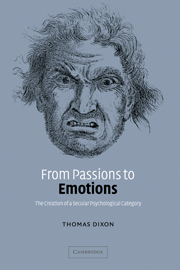Book contents
- Frontmatter
- Contents
- Acknowledgments
- Note on quotations
- 1 Introduction: from passions and affections to emotions
- 2 Passions and affections in Augustine and Aquinas
- 3 From movements to mechanisms: passions, sentiments and affections in the Age of Reason
- 4 The Scottish creation of ‘the emotions’: David Hume, Thomas Brown, Thomas Chalmers
- 5 The physicalist appropriation of Brownian emotions: Alexander Bain, Herbert Spencer, Charles Darwin
- 6 Christian and theistic responses to the new physicalist emotions paradigm
- 7 What was an emotion in 1884? William James and his critics
- 8 Conclusions: how history can help us think about ‘the emotions’
- Bibliography
- Index
2 - Passions and affections in Augustine and Aquinas
Published online by Cambridge University Press: 22 September 2009
- Frontmatter
- Contents
- Acknowledgments
- Note on quotations
- 1 Introduction: from passions and affections to emotions
- 2 Passions and affections in Augustine and Aquinas
- 3 From movements to mechanisms: passions, sentiments and affections in the Age of Reason
- 4 The Scottish creation of ‘the emotions’: David Hume, Thomas Brown, Thomas Chalmers
- 5 The physicalist appropriation of Brownian emotions: Alexander Bain, Herbert Spencer, Charles Darwin
- 6 Christian and theistic responses to the new physicalist emotions paradigm
- 7 What was an emotion in 1884? William James and his critics
- 8 Conclusions: how history can help us think about ‘the emotions’
- Bibliography
- Index
Summary
The words ‘love’, ‘desire’ and so on are used in two senses. Sometimes they mean passions, with some arousal in the soul. This is what the words are generally taken to mean, and such passions exist solely at the level of sense appetite. But they can be used to denote simple attraction, without passion or perturbation of the soul, and such acts are acts of will. And in this sense the words apply to angels and to God.
St Thomas Aquinas, Summa Theologiae, Ia.82, 5 ad 1Classical Christian psychology
Some familiarity with Christian understandings of the soul will be invaluable when it comes to trying to analyse historical transitions of uses and meanings of different psychological terms (such as ‘will’, ‘passions’ and ‘emotions’) in the eighteenth and nineteenth centuries. It is impossible to pin down exactly what ‘Christian psychology’ is. There have been many different Christian psychologies ranging from biblical views of human minds and bodies to twentieth-century Christianised counselling psychologies. The phrase ‘classical Christian psychology’ is intended to refer to a core of Christian teaching about the soul that relatively consistently informed Western Christian culture and thought, at least until the nineteenth century. The decisions I have made about what are to count here as ‘core’ Christian teachings are, of course, by no means intended to be definitive.
- Type
- Chapter
- Information
- From Passions to EmotionsThe Creation of a Secular Psychological Category, pp. 26 - 61Publisher: Cambridge University PressPrint publication year: 2003



